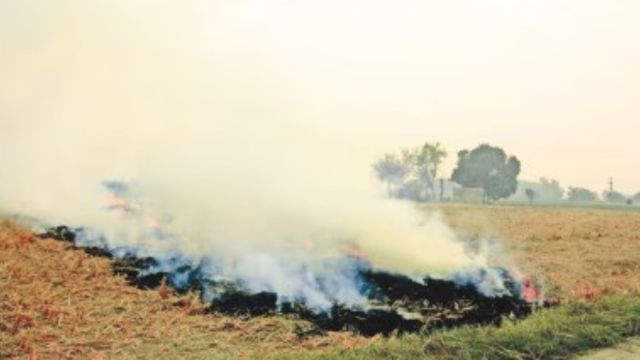Place on record action taken on stubble burning, National Green Tribunal tells Punjab Govt
Delhi’s air quality is in the ‘very poor’ category and expected to continue to be so for the upcoming days, as per Indian Institute of Tropical Meteorology.
 Paddy stubble burning is considered as one of the key sources of air pollution in the NCR. (File)
Paddy stubble burning is considered as one of the key sources of air pollution in the NCR. (File)The National Green Tribunal (NGT) on Monday directed the Punjab Government to submit what action it has taken to control paddy stubble burning in the state. The principal bench, headed by Justice Prakash Shrivastava, directed the state to submit an affidavit in this regard by October 25, after the Supreme Court has heard a matter listed this week on the issue.
“The Supreme Court is considering lapses on part of the state of Punjab and Haryana in taking steps to control stubble burning. Accordingly, the Supreme Court has called for an explanation from Punjab and Haryana and directed their chief secretaries to remain present on October 23,” the bench said.
“In view of the above, counsel for Punjab is directed to place on record an affidavit, indicating the effective action taken at the ground level by Friday,” the bench said in its order.
The tribunal adjourned the matter till October 25.
During the hearing, the bench pulled up the state government and sought to know why there was no change in air quality in the state and the National Capital Region (NCR) if it had taken action. Paddy stubble burning is considered as one of the key sources of air pollution in the NCR, especially between September-end and mid-November.
On Monday, the national capital’s air quality is in the “very poor” category and expected to continue to be so for the upcoming days, according to Indian Institute of Tropical Meteorology. Meteorological conditions are likely to be unfavourable for dispersal of pollutants, as per the forecast.
The Punjab Government’s counsel, Rahul Mehra, sought to point out that all states affected by air pollution in North India need to put their heads together and also look at common airshed management. An airshed is a defined geographic area where the air quality is influenced by similar meteorological and topographical conditions.
Mehra argued that since 2022, stubble burning fires had shown a declining trend for the September 15-October 15 period. In 2022 and 2023, there were 2,721 and 1,618 farm fires during the period, he said, whereas so far this year, the number stood at 1,445.
However, the bench observed that plans are made, meetings take place but nothing happens later.
NGT Chairperson Justice Shrivastava said the state government has to start with itself and set an example before seeking to point fingers at others, adding that the pollution in the capital causes serious health hazards.













